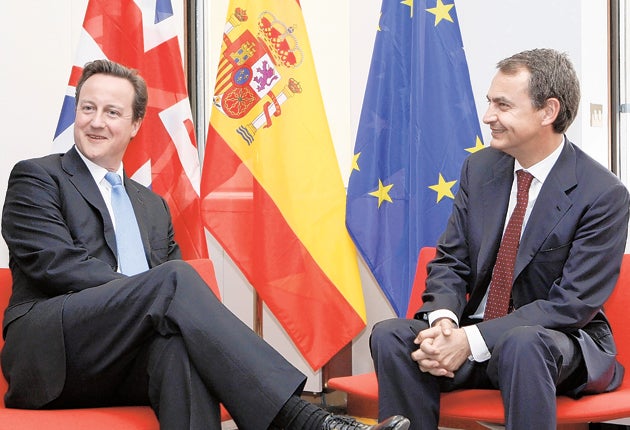Relaxed Cameron agrees to bank stress tests on first trip to Brussels

Your support helps us to tell the story
From reproductive rights to climate change to Big Tech, The Independent is on the ground when the story is developing. Whether it's investigating the financials of Elon Musk's pro-Trump PAC or producing our latest documentary, 'The A Word', which shines a light on the American women fighting for reproductive rights, we know how important it is to parse out the facts from the messaging.
At such a critical moment in US history, we need reporters on the ground. Your donation allows us to keep sending journalists to speak to both sides of the story.
The Independent is trusted by Americans across the entire political spectrum. And unlike many other quality news outlets, we choose not to lock Americans out of our reporting and analysis with paywalls. We believe quality journalism should be available to everyone, paid for by those who can afford it.
Your support makes all the difference.European Union leaders tried to calm the jittery money markets yesterday by promising to cut their countries' bulging deficits and subject their banks to urgent "stress tests" to prevent another financial crisis.
An EU summit in Brussels agreed that 25 banks in Europe would undergo "stress tests" by national financial regulators by next month. They include four in Britain – HSBC, the Royal Bank of Scotland, Barclays and Lloyds – but those most at risk are likely to be smaller institutions in Spain and Germany.
Jose Manuel Barroso, the president of the European Commission, welcomed the decision to make the "stress tests" public. "This should reassure investors by either lifting unfounded suspicion or by dealing with the remaining problems that may exist," he said. "If state intervention is needed, this will be examined in a timely manner under the Community rules."
EU leaders played down growing fears that Spain is on the brink of a Greek-style crisis. Although public unity was maintained, there was behind-the-scenes criticism from smaller EU states that the moves to ensure budgetary discipline were "another stitch-up" by France and Germany.
At his first EU summit, David Cameron's positive stance was warmly welcomed by his counterparts. He won a temporary reprieve when the summit agreed that new measures to rein in budget deficits and impose sanctions on offenders should not apply to Britain. Several member states want the penalties to apply to all 27 nations, but Britain argues they should affect only the 16 in the troubled eurozone.
The Prime Minister said the summit conclusions had been toughened to make clear that Britain was a special case due to its opt-out from the 1992 Maastricht Treaty, which created the single currency. He also watered down a plan for national governments to submit their Budget proposals to Brussels before announcing them, insisting that Britain's annual Budget would still be presented to Parliament first.
However, Mr Cameron acknowledged that Britain could come under renewed pressure to be sucked into EU-wide measures when the plans are finalised in October. "Our red line is that we do not support and will not support the transfer of powers from Westminster to Brussels," he said. The coalition government has promised a referendum before any such transfer – but Mr Cameron and Nick Clegg are determined to avoid a public vote on Europe.
Mr Cameron said the trend in Europe was towards inter-governmental co-operation but admitted some members wanted to tackle the economic crisis with a new treaty, which he opposes.
Promising to be "pragmatic and sensible" on Europe, Mr Cameron said: "It is not in our interests to have a weak eurozone." He said Britain would help euro members to sort out its problems – but not financially. In the summit, Mr Cameron opposed a move by Nicolas Sarkozy, the French President who visits Britain today, for a tax on financial transactions with the proceeds put into an EU pot. Britain backs a levy on banks but wants to keep the revenue in Treasury coffers.
Although relations between Sarkozy and Angela Merkel, the German Chancellor, are at an all-time low, there is criticism that they "fixed" the EU's response to its economic woes. "There is growing frustration at the way smaller EU countries are being shunted aside," said one EU diplomat."The Netherlands and Luxembourg feel they are no longer even getting a look-in."
Herman Van Rompuy, the President of the European Council, was accused of kowtowing to Paris and Berlin. The former Belgian Prime Minister belatedly set up a task force to map out a new economic growth and fiscal discipline policy but it has been largely hijacked by France and Germany.
"Van Rompuy seems to be largely shuttling to and fro between Paris and Berlin and getting them to agree," said the diplomat. "There is a new assertiveness in Germany and that is being felt all over Europe. If we pay, we decide, they seem to be saying."
EU leaders agreed to open membership negotiations with Iceland, but Britain and the Netherlands immediately threatened to block progress unless a banking dispute was resolved.
Jan Peter Balkenende, outgoing Dutch Prime Minister, said Iceland could see its ambitions to become a member of the EU thwarted unless it reimbursed Britain and the Netherlands when they compensated citizens who held accounts at the failed Icesave bank. "This is a very big deal for us," he said. "Otherwise key [steps] towards accession will be blocked. I am on the same page as David Cameron on this."
Join our commenting forum
Join thought-provoking conversations, follow other Independent readers and see their replies
Comments